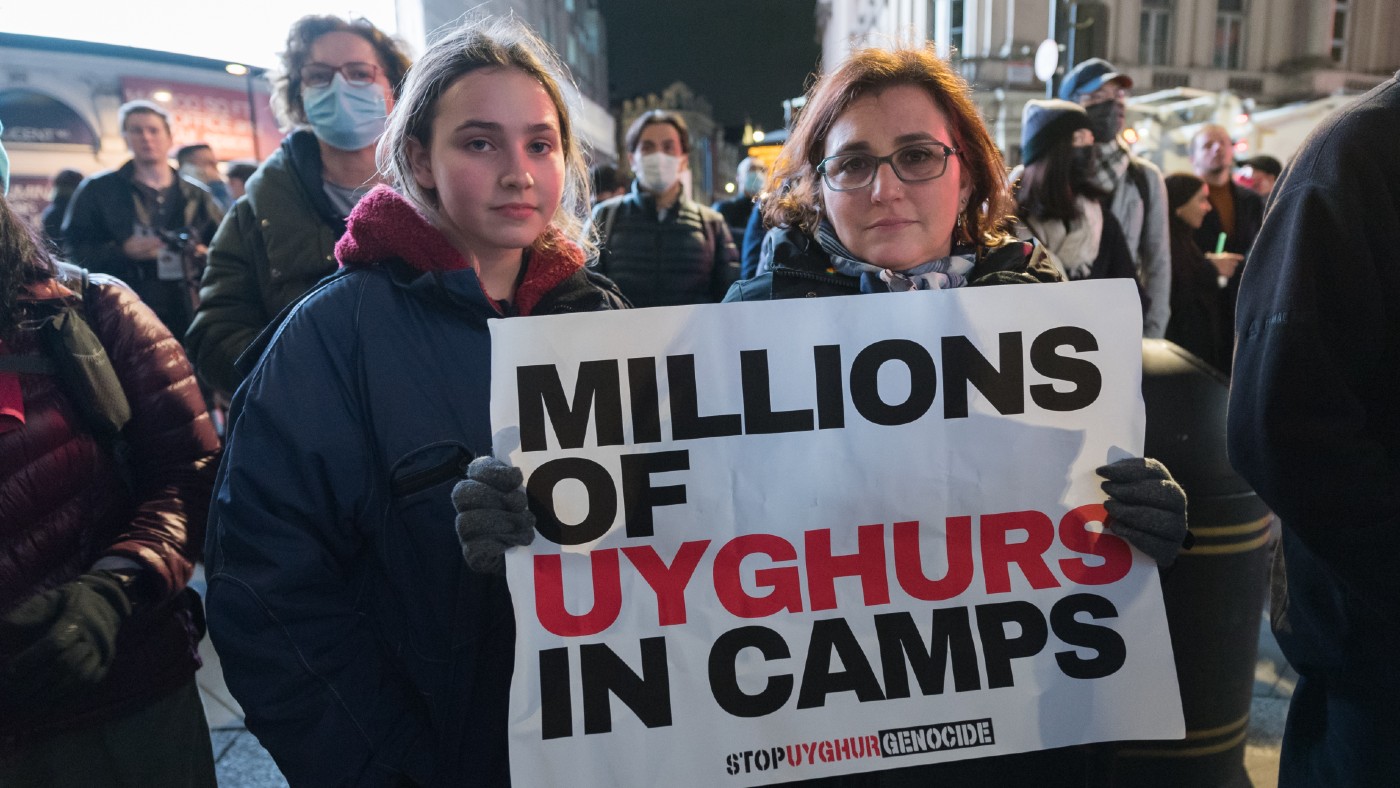China’s ‘modern gulag’: will the leaked Xinjiang files be the wake up call the world needs?
Documents have triggered renewed calls for an investigation into abuses against Uyghurs

A free daily email with the biggest news stories of the day – and the best features from TheWeek.com
You are now subscribed
Your newsletter sign-up was successful
For years, we’ve been hearing tales of how China has been persecuting its Uyghur Muslim population in Xinjiang. Now we know it for a fact, said Al Jazeera (Doha). Last week, a trove of official Chinese documents and photographs dating back to 2017 was leaked to the press. It contained some 300,000 personal records and 2,884 photos of detainees, some as young as 15, said to have been selected for “re-education” at camps in the province.
The photographs showed hooded prisoners manacled at the wrists and ankles, surrounded by guards armed with clubs and guns. The documents lay out a “shoot-to-kill” policy for anyone trying to flee detention, and make it crystal clear that senior Communist Party officials knew precisely what was going on.
Beijing has dismissed the leak, which coincided with a visit to Xinjiang by the UN commissioner for human rights Michelle Bachelet, as “the newest example of a smear campaign by anti-China forces”, said Phoebe Zhang and Owen Churchill in the South China Morning Post (Hong Kong). But the revelations have sparked fresh condemnation of China in Europe and the US, and has triggered renewed calls for a transparent investigation into abuses perpetrated against Uyghurs.
The Week
Escape your echo chamber. Get the facts behind the news, plus analysis from multiple perspectives.

Sign up for The Week's Free Newsletters
From our morning news briefing to a weekly Good News Newsletter, get the best of The Week delivered directly to your inbox.
From our morning news briefing to a weekly Good News Newsletter, get the best of The Week delivered directly to your inbox.
Xinjiang, an area of western China four-and-a-half times the size of Germany, is home to 26 million people, said Bernhard Zand in Der Spiegel (Hamburg). When it first became part of the People’s Republic of China after the civil war in 1949, Uyghurs made up 80% of its population. Yet in the decades that followed, Beijing sent millions of people from other parts of China: Uyghurs, who now make up just 45% of Xinjiang’s population, were marginalised.
From 1990 tensions flared, protests erupted: a minority joined terror groups, launching attacks in which dozens of people were killed. Beijing’s response was to establish “a modern gulag”. At least a million people were sent to “internment and re-education camps”. Parents were separated from their children, men forced into labour; women forcibly sterilised. Beijing has always insisted that the aim of these camps was to provide “professional and further training” and to fight terrorism. But last week’s leak leaves “no room for doubt”: China has engaged in “the comprehensive suppression of an ethnic and denominational minority”.
And it has done so mercilessly, said Bruno Philip in Le Monde (Paris). These revelations, verified by 14 media organisations including Le Monde and the BBC, suggest that in some parts of Xinjiang more than 12% of the adult Uyghur population was detained. Many were held for “benign” acts like reading the Koran or growing beards, which are seen as “harbingers of radicalisation”.
The details in this trove are “harrowing”, agreed Dana Heide in Handelsblatt (Düsseldorf). Yet “the real scandal” is that reports of repression were ignored for so long. Media and victims’ families have sounded the alarm for years, often risking their safety to do so. Yet the world has “looked the other way”, unwilling to confront Beijing. The result? Xinjiang is now a “police state”, where people hardly dare open their mouths – even as their lives, and their religious heritage, are “irrevocably destroyed”.
A free daily email with the biggest news stories of the day – and the best features from TheWeek.com
-
 Political cartoons for February 15
Political cartoons for February 15Cartoons Sunday's political cartoons include political ventriloquism, Europe in the middle, and more
-
 The broken water companies failing England and Wales
The broken water companies failing England and WalesExplainer With rising bills, deteriorating river health and a lack of investment, regulators face an uphill battle to stabilise the industry
-
 A thrilling foodie city in northern Japan
A thrilling foodie city in northern JapanThe Week Recommends The food scene here is ‘unspoilt’ and ‘fun’
-
 The fall of the generals: China’s military purge
The fall of the generals: China’s military purgeIn the Spotlight Xi Jinping’s extraordinary removal of senior general proves that no-one is safe from anti-corruption drive that has investigated millions
-
 Epstein files topple law CEO, roil UK government
Epstein files topple law CEO, roil UK governmentSpeed Read Peter Mandelson, Britain’s former ambassador to the US, is caught up in the scandal
-
 Iran and US prepare to meet after skirmishes
Iran and US prepare to meet after skirmishesSpeed Read The incident comes amid heightened tensions in the Middle East
-
 Syria’s Kurds: abandoned by their US ally
Syria’s Kurds: abandoned by their US allyTalking Point Ahmed al-Sharaa’s lightning offensive against Syrian Kurdistan belies his promise to respect the country’s ethnic minorities
-
 Israel retrieves final hostage’s body from Gaza
Israel retrieves final hostage’s body from GazaSpeed Read The 24-year-old police officer was killed during the initial Hamas attack
-
 China’s Xi targets top general in growing purge
China’s Xi targets top general in growing purgeSpeed Read Zhang Youxia is being investigated over ‘grave violations’ of the law
-
 Panama and Canada are negotiating over a crucial copper mine
Panama and Canada are negotiating over a crucial copper mineIn the Spotlight Panama is set to make a final decision on the mine this summer
-
 Iran unleashes carnage on its own people
Iran unleashes carnage on its own peopleFeature Demonstrations began in late December as an economic protest